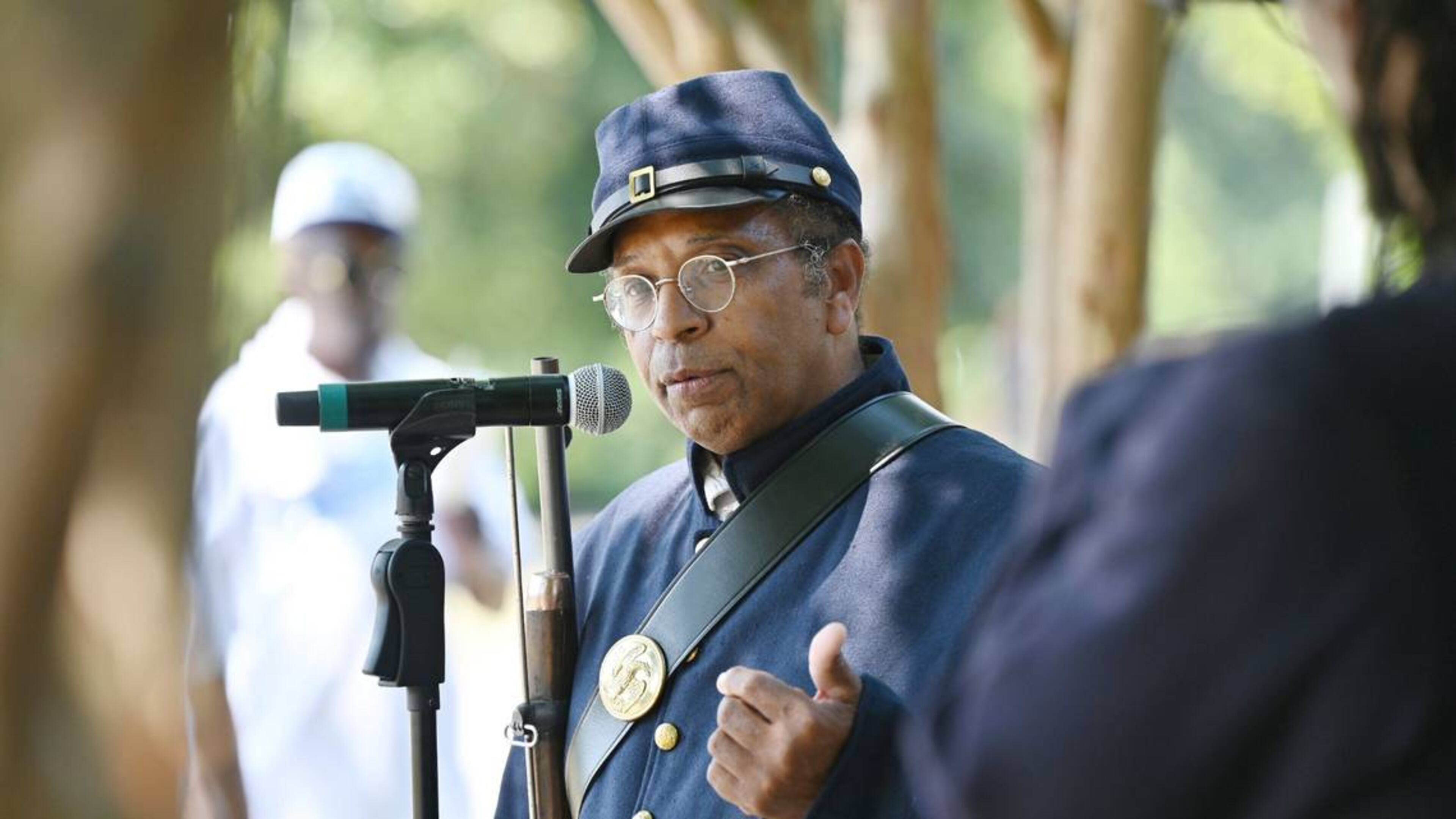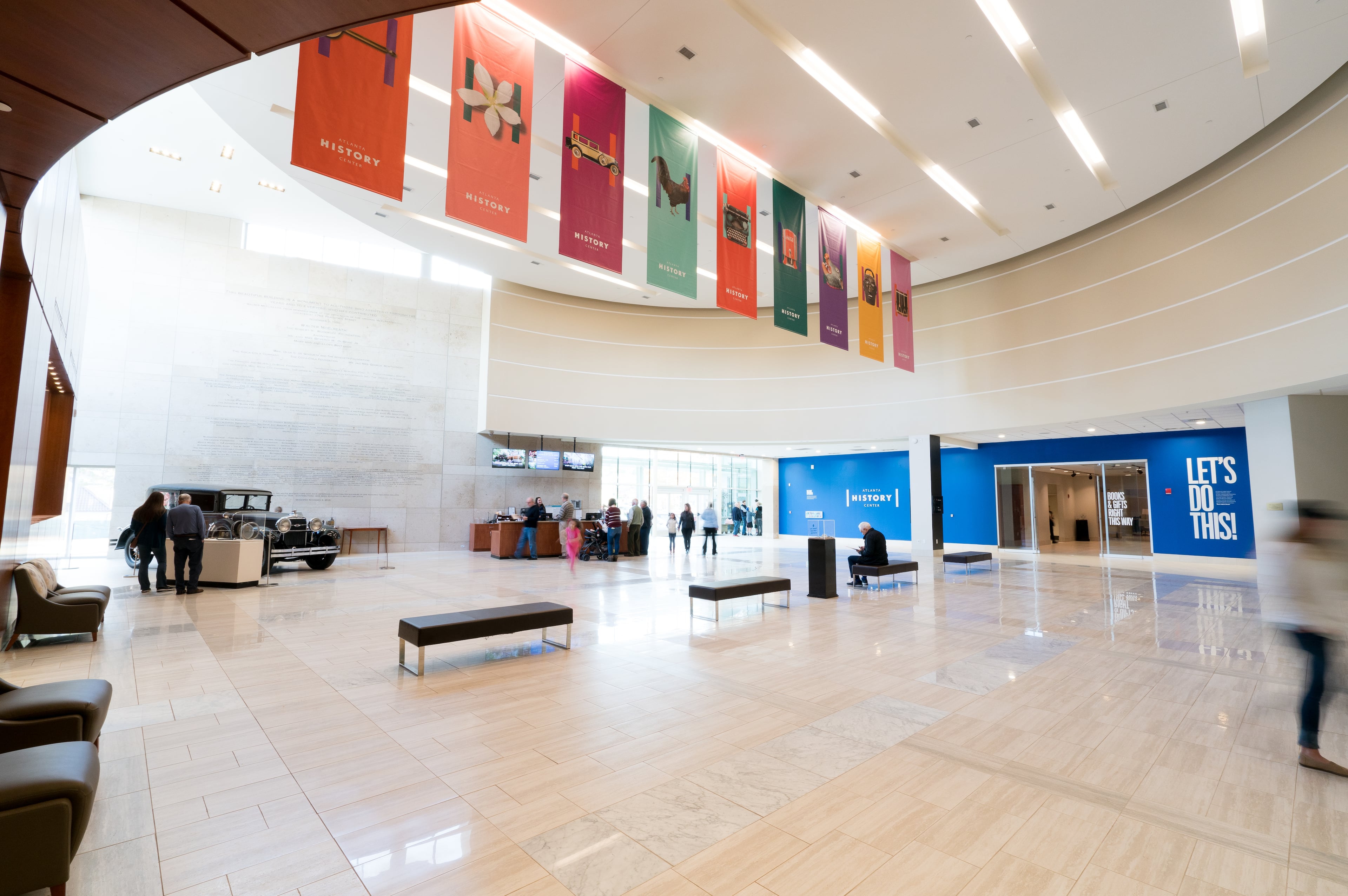Thousands of Black Civil War troops organized in Macon. This veteran is keeping their history alive

This story was originally published by The Telegraph.
Standing in a wool jacket and pants on a summer day where the temperature got into the 90s, Army retiree Lonnie Davis easily drew attention as he prepared to speak in Tattnall Square Park in Macon, Georgia.
The 66-year-old retired park ranger’s blue outfit demonstrated a historically accurate representation of an 1864 Civil War-era Union Army uniform, complete with a replica musket that he handcrafted himself.
He shared with festival attendees a story he has shared repeatedly all over the state — three of the last Black Union regiments in the Civil War, known as the Georgia African Brigade, were organized in Macon in 1865. In fact, they were medically screened right there in Tattnall Square Park, the very same place Davis told their story more than 150 years later.
“This is a part of our history that is not taught to school students and there are a lot of adults who don’t know this story,” said Davis in his presentation. This lack of knowledge on local history motivates Davis to share both the history of Middle Georgia and the history of his ancestors.
What is the Georgia African Brigade?
The Georgia African Brigade consisted of three Black Union regiments formed in the final months of the American Civil War. The 136th, 137th and 138th regiments consisted of more than 3,000 former slaves from the Confederacy that were recruited by Union officials to fight for their freedom. Many were recruited during Wilson’s Raid, led by Union General James H. Wilson to cripple the Confederate army through Selma, Montgomery and Columbus.
The three groups made up a percentage of the 175 United States Colored Troops regiments that fought for the Union Army. Davis wrote in his information booklet, “Georgia’s African Brigade - Slave to Soldier,” that Black regiments made about about 10% of the Union Army’s manpower.

The members of the Georgia African Bridge were recruited towards the end of the war in April 1865 and were organized in Macon. Of the three regiments, only the 137th regiment served in Macon, while the other two went to assist in Atlanta and Augusta. The regiment based in Macon never engaged in combat because of how late they were recruited, but were assigned to cleanup and burial details at Macon’s Camp Oglethorpe and the Camp Sumter Confederate prison near Andersonville.
Davis grew up in neighboring Crawford County, but it took him going all the way to Texas to learn about the three regiments.
“I was taking a history course while I was in the Army ... in El Paso,” Davis said. “Here I am, sitting in a classroom where this college professor from Texas is talking about the Georgia African Brigade … I was like man, this is my backyard but I don’t know anything about this.”
The course showed Davis a personal connection to the brigade that brought him all the way back almost 60 years to a fourth grade family history essay. Davis’ grandparents allowed him exactly two hours with a prized family artifact to do the assignment— his great-great grandfather Cesar Davis’ ledger documenting his time as a part of the Georgia African Brigade in the 137th regiment.
Cesar Davis was a slave on a plantation in Alabama who sought out Union troops with his brother.
“If you follow the Union, you could follow them back to freedom,” said Lonnie Davis.
Cesar Davis kept a detailed account of his time in the war, a rare gem that his great-great grandson knows the uniqueness of centuries later.
“I [only] knew about his story because he was fortunate enough that he could read and write,” said Davis.

Years later when Davis worked at Ocmulgee Mounds National Historic Park as a ranger, an initiative through the National Park Service encouraged parks to examine their place from “Civil War to Civil Rights” in honor of the 150th anniversary of the Civil War in 2011. This led to many Civil War archives becoming digitized and free to access. It created a starting point for Davis to research his family and other brigade members further.
From 2013 to 2015, Davis compiled information on all members of the Georgia African Brigade into one document, including the enlisted men’s names, rank, place of birth, age at enlistment and date of death if known.
“Wilson’s Raid was originally planned to demoralize the people of the Confederacy,” wrote Davis in the booklet’s introduction. “…these regiments became the foundation of fulfilling the wording of the Declaration of Independence which proclaimed that all men are created equal…”
More than a dozen have found family who served
Since creating his comprehensive resource on the Georgia African Brigade and sharing the information through programming, Davis said 16 people have found family members that served in the regiments.
“Most people are surprised,” Davis said when asked how people react to his presentations. “I’ve had people tell me, ‘I didn’t know that because it wasn’t taught to me.’”

In 2021, the Georgia State Board of Education passed a resolution that limited how race is taught in state public schools, including that “an individual shouldn’t feel discomfort, guilt… on account of his or her race…”
Davis said restricting conversations about slavery and the Civil War in schools limits understanding.
“Even before Georgia legislation passed these laws about critical race theory…teachers really didn’t know how to tell that story,” he said. “That’s the thing about history. You have to take the good with the bad.”
Now, two years after Davis has retired from the National Park Service, he still takes it upon himself to share local history that may not be discussed in schools, wearing a uniform and bearing a musket. He refuses payment for his books, which he now binds and prints himself at home. He has made 12 musket replicas, and has given most of them away.
One of his muskets and an old version of his Union uniform were donated and are on display at the Tubman African American Museum in downtown Macon as a part of their “Untold Stories: Macon’s African American History” exhibit.
“We talk about big topics,” said Jeff Bruce, Tubman Museum director of exhibitions. “We illustrate those big topics with local stories. So that people from the community, they come in and see their stories. The people who have no connection to Macon can come and identify with those stories as well.”
Right in the middle of the exhibit is Davis’ uniform, bringing the story of a national conflict back to Macon.
“When you think about the Civil War, don’t think about what happened at Gettysburg, Spotsylvania, Bull Run,” said Davis. “What you have to look at is what happened locally to affect the Union.”

Could local reenactments start?
During the Juneteenth presentation, Lonnie Davis stood on stage with two other men to share information on the United States Colored Troops. However, the other two men represented the 54th Massachusetts Infantry Regiment and came up from Florida for the festival.
When it comes to living history presentations on the Georgia African Brigade, Davis is largely on his own.
He shared that his children are not interested in continuing his role, but he has had some local pressure to start a reenactment chapter in Macon with plans of getting local high school JROTC members involved.
Davis said that his plan would lead the living history group for the 137th regiment and allow people in Atlanta and Augusta to create their own groups for the other two regiments.
“I [also] want to create an auxiliary for each one of those [regiments] so young women would be able to participate…showing what life was like for women.”
Plans for sharing the responsibility of the Georgia African Brigade’s legacy doesn’t necessarily mean Davis is slowing down. He wants those that come to his presentations to engage fully. He includes his personal phone number and email in his booklet to allow people to comment or ask questions about the document.
“I tell people…if you have questions, you have to ask them because in my book, there is no stupid question… I told them I could sit here and talk all day… I have the gift of gab.”

MEET OUR PARTNER
Today’s story comes from our partner The Telegraph in Macon. The Telegraph provides daily coverage of community news, events, and sports in Macon and middle Georgia at macon.com.
If you have any feedback or questions about our partnerships, you can contact Senior Manager of Partnerships Nicole Williams via email at nicole.williams@ajc.com.

